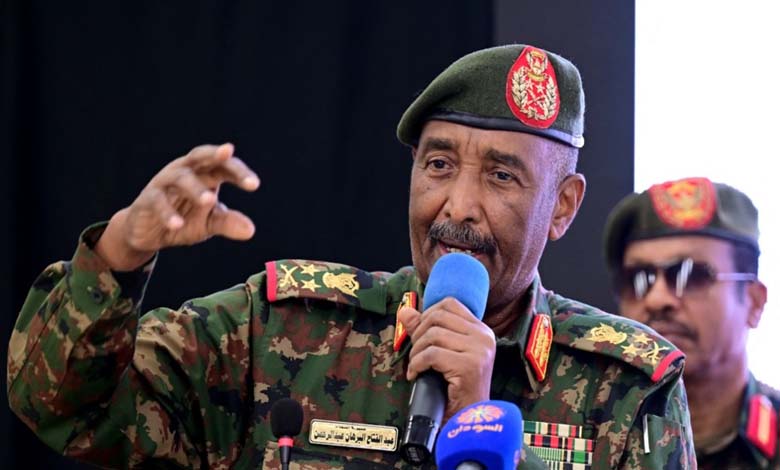US Sanctions on Sudan’s Army Chief: What Impact?

The sanctions imposed by the United States on Sudanese army chief Abdel Fattah al-Burhan raise questions about their impact in the context of a war that has been ongoing for nearly two years.
-
Al-Burhan’s insistence on replacing the currency threatens to deepen Sudan’s economic crisis
-
Has al-Burhan Reached the Expiration Date of the Muslim Brotherhood?
On Thursday evening, the United States announced sanctions against al-Burhan, accusing his forces of carrying out attacks on civilians, just days after similar measures targeted the leader of the Rapid Support Forces (RSF).
US Secretary of State Antony Blinken stated: “Members of the Sudanese Armed Forces, under al-Burhan’s leadership, have continued to commit atrocities, notably targeting civilians, destroying civilian infrastructure, and executing civilians.”
-
Will the “Central Bank” Cause a New Crisis Between Burhan and the Muslim Brotherhood?
-
Washington Pressures Al-Burhan by Insisting on Geneva Talks as a New Model for Peace
He added: “The Sudanese Armed Forces have violated international humanitarian law, used starvation as a tactic of war, and obstructed peace efforts.”
Since mid-April 2023, the army and the RSF have been engaged in a conflict that has caused approximately 20,000 deaths and displaced over 14 million people, according to the United Nations.
-
Al-Burhan Sends ‘Rescue’ Delegation to Egypt in New Political Maneuver
-
Attempted Assassination of al-Burhan: Internal and External Escalation in Sudan?
Before the Decision
Al-Burhan, who also heads the Sudanese Sovereign Council, preempted the US sanctions by declaring his readiness to confront them.
He stated, “I heard there are sanctions on army leaders. We are prepared for any sanctions and welcome them if they serve the country.”
These remarks were made on Thursday during a visit to Wad Madani, the capital of Gezira State, which his forces recaptured last Saturday.
The sanctions follow earlier US measures against RSF leader Mohamed Hamdan Dagalo, known as “Hemetti.”
-
The Attempted Assassination of al-Burhan: Between Allegations of Foreign Intervention and Internal Tactics
-
The Attempted Assassination of al-Burhan Sparks Debate on the Involvement of the Islamic Movement and the Army
What Impact?
Sudanese writer and political analyst Anwar Suleiman believes that “the sanctions will have little effect, as they have not significantly impacted Cuba, North Korea, or Iran, nor did they affect Sudan’s previous regime under Omar al-Bashir.”
He said: “Al-Burhan and most of his aides, remnants of the old regime, are well-versed in circumventing sanctions through proven tactics that remain effective.”
-
Al-Burhan’s Desire to Step Down Reveals the Army’s Desperation to Win the Battle
-
Abdel Fattah al-Burhan: Involved in War Crimes and Subject to the Muslim Brotherhood’s Agenda
He added: “Al-Burhan and his allies were never truly invested in lifting sanctions or being removed from terrorism lists, as evidenced by their coup against civilian partners in the transitional government.”
Similarly, Sudanese political analyst Mohamed Al-Asbat said, “These sanctions will not affect the Sudanese army or military operations because the leaders have no assets or accounts abroad.”
He noted, “The sanctions will mainly have a limited political and diplomatic impact.”
-
Sudan: Al-Burhan Rejects Dialogue Initiatives
-
Al-Burhan Rejects All Mediation Efforts to Resolve Sudan Crisis for Personal Gains
Islamist Agendas
According to Abbas Mohamed Ibrahim, writer and analyst, “A few years ago, al-Burhan sought to present himself as a military leader capable of steering Sudan toward democracy. Today, he finds himself facing US sanctions, trapped in the plans of Sudanese Islamists.”
He explained, “Over the past two years, al-Burhan has wavered between a political settlement and total war. This indecision has trapped him in a path where the army is increasingly aligned with Islamist alliances.”
-
Have al-Burhan’s supporters lost faith in the Sudanese Army?
-
The Muslim Brotherhood and Al-Burhan lose the battle… The Army is in Turmoil
Ibrahim added, “The key question is whether the sanctions will prompt al-Burhan to change his strategy or push him further into the arms of Islamists, deepening the army’s isolation and complicating prospects for peace.”
He concluded, “What is evident is that al-Burhan is caught between international sanctions and Islamists, who will not allow him to exit the conflict easily.”
-
The Brotherhood Pressures Al-Burhan to Pass the “Popular Resistance” Law: Details
-
The Muslim Brotherhood Promised al-Atta Leadership of the Army after Ousting al-Burhan… Details
The UN warns that Sudan, already one of the world’s poorest countries before the war, is facing “one of the worst displacement crises globally” and is on the brink of an unprecedented famine.
Global calls to end the war are intensifying to prevent a humanitarian disaster that is driving millions into starvation and death.
-
Al-Burhan Targets Hamdok with Death Penalty to Foil Ceasefire Efforts
-
From Iraq and Lebanon to Yemen and then Sudan… Al-Burhan Tilts Iran Militias in Africa











